Related Research Articles

The Polish United Workers' Party, commonly abbreviated to PZPR, was the communist party which ruled the Polish People's Republic as a one-party state from 1948 to 1989. The PZPR had led two other legally permitted subordinate minor parties together as the Front of National Unity and later Patriotic Movement for National Rebirth. Ideologically, it was based on the theories of Marxism-Leninism, with a strong emphasis on left-wing nationalism. The Polish United Workers' Party had total control over public institutions in the country as well as the Polish People's Army, the UB and SB security agencies, the Citizens' Militia (MO) police force and the media.
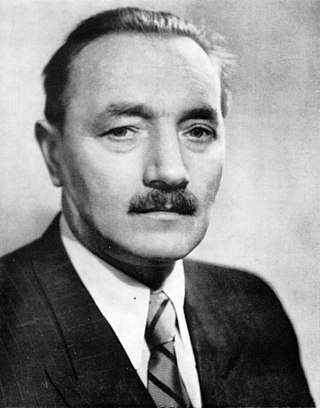
Bolesław Bierut was a Polish communist activist and politician, leader of communist-ruled Poland from 1947 until 1956. He was President of the State National Council from 1944 to 1947, President of Poland from 1947 to 1952, General Secretary of the Central Committee of the Polish United Workers' Party from 1948 to 1956, and Prime Minister of Poland from 1952 to 1954. Bierut was a self-educated person. He implemented aspects of the Stalinist system in Poland. Together with Władysław Gomułka, his main rival, Bierut is chiefly responsible for the historic changes that Poland underwent in the aftermath of World War II. Unlike any of his communist successors, Bierut led Poland until his death.
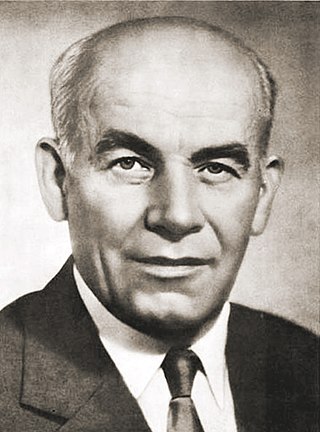
Władysław Gomułka was a Polish Communist politician. He was the de facto leader of post-war Poland from 1947 until 1948, and again from 1956 to 1970.
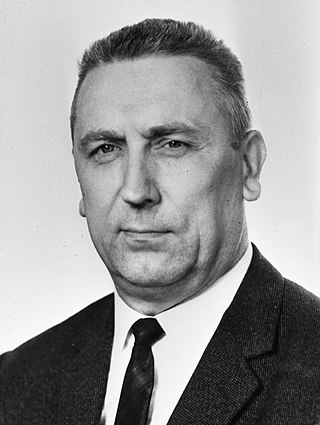
Edward Gierek was a Polish Communist politician and de facto leader of Poland between 1970 and 1980. Gierek replaced Władysław Gomułka as First Secretary of the ruling Polish United Workers' Party (PZPR) in the Polish People's Republic in 1970. He is known for opening communist Poland to the Western Bloc and for his economic policies based on foreign loans. He was removed from power after labor strikes led to the Gdańsk Agreement between the communist state and workers of the emerging Solidarity free trade union movement.
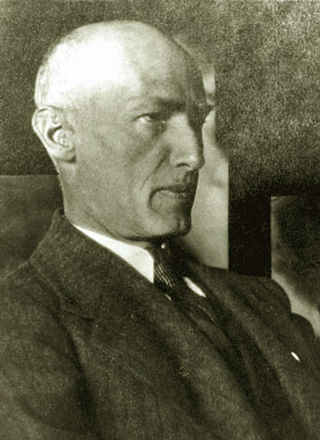
Eligiusz Niewiadomski was a Polish modernist painter and art critic who sympathized with the right-wing National Democracy movement. In 1922 he assassinated Poland's first President, Gabriel Narutowicz, in his first week in office as president.

Jacek Jan Kuroń was one of the democratic leaders of opposition in the People's Republic of Poland. He was widely known as the "godfather of the Polish opposition," not unlike Václav Havel in Czechoslovakia. Kuroń was a prominent Polish social and political figure known for his efforts at reforming societies under the control of the Soviet Union. As an educator and historian, he first postulated the concept of a de-centered movement that would question the totalitarian system and its personality cult. Kuroń started out as an activist of the Polish Scouting Association trying to educate young people that would take charge of the future; he later co-founded with Antoni Macierewicz the Workers' Defence Committee or KOR, a major dissident organization that was superseded by Solidarity in August 1980. After the changes in independent Poland, he ran for president supported by the likes of Jan Karski and served twice as Minister of Labour and Social Policy. Kuroń was the father of chef Maciej Kuroń.

Jan Ferdynand Olszewski was a Polish conservative lawyer and politician who served as the Prime Minister of Poland for five months between December 1991 and early June 1992 and later became a leading figure of the conservative Movement for the Reconstruction of Poland.

The history of Poland from 1945 to 1989 spans the period of Marxist–Leninist regime in Poland after the end of World War II. These years, while featuring general industrialization, urbanization and many improvements in the standard of living,[a1] were marred by early Stalinist repressions, social unrest, political strife and severe economic difficulties. Near the end of World War II, the advancing Soviet Red Army, along with the Polish Armed Forces in the East, pushed out the Nazi German forces from occupied Poland. In February 1945, the Yalta Conference sanctioned the formation of a provisional government of Poland from a compromise coalition, until postwar elections. Joseph Stalin, the leader of the Soviet Union, manipulated the implementation of that ruling. A practically communist-controlled Provisional Government of National Unity was formed in Warsaw by ignoring the Polish government-in-exile based in London since 1940.
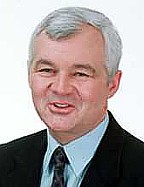
Jan Krzysztof Bielecki is a Polish liberal politician and economist. A leading figure of the Gdańsk-based Liberal Democratic Congress in the early 1990s, Bielecki served as Prime Minister of Poland for most of 1991. In his post-political career, Bielecki served as president of Bank Pekao between 2003 and 2010, and served as the president of the Polish Institute of International Affairs between 2009 and 2015. Since the early 2000s, Bielecki has been a member of the Civic Platform party. In 2010, the Warsaw Business Journal described Bielecki as one of the most respected economists in Poland.

Antoni Macierewicz is a Polish politician and the former Minister of National Defence. He previously served as the Minister of Internal Affairs, Head of the Military Counterintelligence Service, and Minister of State in the Ministry of National Defence.

Anna Maria Radziwiłł was a Polish historian, educator, and politician. She was a former member of the Polish Senate and Minister of Education, and was very active in educational reform and the underground educational movement during the Communist era in Poland.
The Workers' Defense Committee was a Polish civil society group that was established to give aid to prisoners and their families after the June 1976 protests and ensuing government crackdown. KOR was an example of successful social organizing based on specific issues relevant to the public's daily lives. It was a precursor and inspiration for efforts of the Solidarity trade union a few years later.

Robert Leszek Moczulski is a Polish historian and politician, a member of various organizations, first supporting then supposedly opposing the communist regime in the People's Republic of Poland while dividing the opposition movement.
Stefan Staszewski, also known as Gustaw Szuster or Gustaw Szusterman, was a Polish communist politician. An activist in the communist movement from the age of fourteen, he was in the Secretariat of the Central Committee of the Communist Party of Poland in 1930–1932. His arrests in Poland were followed by extended stays in the Soviet Union. He graduated from and after 1934 became an instructor at the International Lenin School in Moscow. At the time of the Great Purge, Staszewski was arrested by the NKVD and in 1938 sentenced to eight years in Kolyma. On his release in 1945, he returned to Poland.
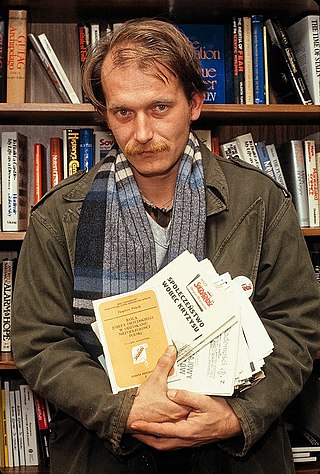
Mirosław Chojecki is a Polish publisher and film producer. He was an activist in the democratic anti-communist opposition during the period of the People's Republic of Poland.
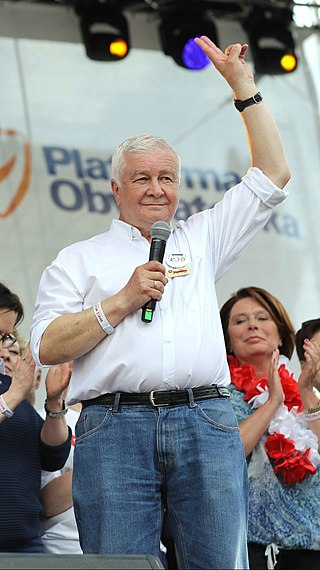
Krzysztof Łoziński is a Polish writer, publicist, alpinist, teacher and anti-communist opposition activist in Polish People's Republic.
Tadeusz Kowalik was a Polish economist, public intellectual and political and social activist. As a prolific publicist in the area of political economy, he is notable for his dissenting leftist views expressed during the Polish systemic transformation.
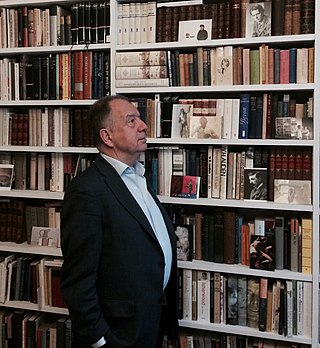
Wojciech Karpiński was a Polish writer, historian of ideas and literary critic.

Jacek Krzysztof Czaputowicz is a Polish politician and academic who served as Minister of Foreign Affairs of Poland from 9 January 2018 to 20 August 2020.
Zygmunt Felczak was a Polish politician. He was a member of the State National Council and a deputy governor of Pomerania. As an activist of the National Workers' Party and the Labour Faction, he founded the daily paper "Ilustrowany Kurier Polski" and took part in the Warsaw uprising.
References
- Krzysztof Gajda (1998). Poza państwowym monopolem - Jan Krzysztof Kelus (Outside of State Monopoly - Jan Krzysztof Kelus). Poznań: WiS. p. 120. ISBN 83-87346-31-4.
- Jan Krzysztof Kelus; Wojciech Staszewski (1999). Był raz dobry świat... (Once Upon a Time There Was a Good World...). Warsaw: Prószyński i S-ka. p. 309. ISBN 83-7180-502-0.